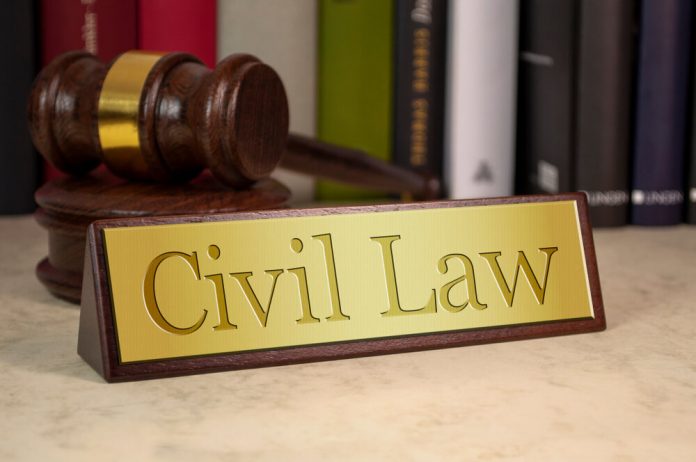This article is written by J Jerusha Melanie, a student of SRM School of Law, Tamil Nadu. This article seeks to explain the concept of Civil Law, including the difference between civil, criminal, and common law.
This article has been published by Sneha Mahawar.
Table of Contents
Introduction
Anybody having a basic understanding of the legal systems around the world will know that there are broad branches of law. Generally, the branches are-
- Procedural and substantive law;
- International and municipal law;
- Public and private law; and
- Civil and criminal law.
Categorising the above- mentioned branches plays a crucial role in the ease of proceedings, and ultimately, the effective rendering of justice. This article will try to explain all about the branch of civil law specifically.
Meaning of Civil Law
As defined by the famous jurist, John Salmond, civil law is “the law of the State or the law of the land, the law of lawyers and the law of courts.”
The term civil law is derived from the ancient Roman term “jus civile” literally meaning citizens’ law, which was used to denote the law enforced exclusively in the city of Rome. It is also called Romano-Germanic law.
Civil law is a system of law or body of rules dealing with the civil or private rights of citizens and not the public at large. It is primarily concerned with the private relations between two or more citizens and is generally codified.
Origin of Civil Law
Civil law, as a legal system of codified law, was introduced by the ancient Roman Law called the Corpus Juris Civilis (meaning Body of Civil Law). It is a collection of legal works in jurisprudence, issued from 527 to 565 AD by the imperial order of Justinian I, a Byzantine Emperor. For obvious reasons, it is also known as the Code of Justinian. It was made under the direction of Tribonian, a notable jurist in Justinian’s Court in Constantinople.
The concepts in Corpus Juris Civilis then spread all over Europe. Though not as influential as in its golden days, it still serves as a basis for modern civil law systems around the world.
Where can we find Civil Law
Some of the countries that follow civil law systems are listed below:
- Argentina
- Austria
- Brazil
- Belgium
- China
- Chile
- Columbia
- The Czech Republic
- France
- Germany
- Italy
- Japan
- Mexico
- Russia
- Sweden
- Switzerland
- Ukraine, etc.
Features of Civil Law
The following are the predominant features of civil law:
Relating to the private rights of citizens
As aforementioned, civil law exclusively deals with the private rights of citizens. It applies to the disputes between two or more individuals or legal entities, concerning any legal relationship or obligation. It is enjoyed by the citizens who inhabit a particular state which commands obedience through the judicial processes. Civil law aims to operate in two ways:
- Protect citizens’ rights from being infringed, and
- Restore citizens’ rights in case of an infringement.
Codification
Civil laws are almost always a set of codified laws. A codified civil law consists of a series of articles in the form of general rules, that are flexible enough to be applied to concrete circumstances. Such an application, however, requires judicial interpretation, considering the ‘spirit’ of the code.
The codification of civil laws has the following advantages:
- It establishes greater certainty of law in a legal system. It is clear and specified, unlike vague customary laws, thereby making citizens trust the judiciary;
- It makes studying laws easier, as specific provisions can be effortlessly and systematically remembered and applied; and
- It can be easily amended depending on the changing needs of the state.
Civil liability
One of the exclusive features of civil law is that it imposes civil liability on the offender. Civil liability refers to the obligation of a person to compensate for the damage caused to another person or his property. This means, the citizen who committed a civil wrong against another citizen, is liable to compensate, in specific, the citizen whom he wronged. There exists a one-to-one obligation to compensate in civil law. This is contrary to criminal law, wherein the criminal is sentenced or fined for a crime affecting society at large.
Subjective application
The extent of application of civil laws may subjectively vary depending on the territory, citizens, etc.
Branches of Civil Law
Civil law is an incredibly exhaustive branch of law, covering a plethora of disputes that concern the rights and obligations of citizens. The following are a few branches arising out of civil law:
Contract Law
Contract law is a branch of civil law that governs, enforces, and interprets agreements related to an exchange of goods, services, properties, or monies. It does not just confer the contractual rights and obligations of the contracting parties, but also provides the remedies available to the injured party. The contract law also prescribes in what way the remedies can be availed.
The statute governing contract law in India is the Indian Contracts Act, 1872, which defines a contract as “an agreement enforceable by law” (Section 2(h)). The Indian Contract Act, 1872 enumerates various types of contracts like contracts of bailment, indemnity, agency, etc. It also specifies when a contract is valid, void, or voidable.
Property Law
Property law is that branch of civil law which deals with the belongings of citizens. It governs the rights of citizens over the use or transfer of their own property and restrictions applicable to them regarding others’ property. There are broadly two types of property- real and personal property. Personal property refers to moveable and tangible (or intangible) property like vehicles, furniture, stocks, etc. Real property refers to the immovables like land, buildings, etc.
Some of the statutes governing property law in India are the Transfer of Property Act, 1882, The Indian Contract Act, 1872, Indian Easement Act, 1882, etc.
Family Law
Family law governs the relations and interactions among citizens of a particular family. It provides the rights and liabilities of family members in the aspects of divorce, marriage, adoption, maintenance, etc.
Some of the statutes governing family law in India are the Hindu Marriage Act, 1955, Indian Christian Marriage Act 1872, Dissolution of Muslim Marriages Act, 1939, Muslim Women (Protection of Rights on Divorce) Act, 2019, etc.
Tort Law
A tort is basically a civil wrong, done by a person or entity to another, which results in his injury or damage to his property. Under civil tort law, the aggrieved party can recover damages from the wrongdoer. Generally, tort law is uncodified. Examples of tort are trespass, negligence, defamation, etc.
Corporate Law
Corporate laws govern the rights and liabilities concerning the functioning of corporate entities, that are, companies. The corporate Section of civil law regulates the formation, winding up, investments, etc. of the company. A few of the statutes relating to corporate law are the Companies Act, 1956, Sale of Goods Act, 1930, Indian Partnership Act, 1932, etc.
Administrative Law
As per Ivor Jennings, administrative law is the one which determines the organisation, power and duties of administrative authorities. It pertains to the functioning of the executive branch of the government. It is generally uncodified; however, there are specialised courts or tribunals for administrative law-related matters.
Types of cases decided under Civil Law
Generally, there are 4 types of cases decided under civil law:
Tort claims
As afore-mentioned, a tort is basically a civil wrong, done by a person or entity to another, which results in his injury or damage to his property. A claim under tort law can be classified as:
- Negligence: Causing unintentional injury or damage;
- Intentional: Deliberately causing injury or damage, or
- Strict liability: Causing injury or damage as a result of failure to keep safe (or prevent from escaping) something that the wrongdoer possesses.
Examples of tort claims are
- Professional negligence,
- Trespass,
- Animal attacks (eg. dog bites),
- Defamation, etc.
Contractual breach claims
Claims for breach of contract arise when one or more of the contractual parties fail to fulfil their contractual obligations. Examples of a contractual breach are:
- Disputes over the sale of property,
- Sale of a defective product,
- Non-payment of money,
- Violation of contractual conditions, etc.
Equitable claims
Equitable claims are also called injunction suits. The desired outcome of these types of cases is to stop someone (either an individual or legal entity) from doing a certain act, rather than getting monetary compensation. Equitable claims may conclude in the court asking the wrongdoer to:
- Stop the action,
- Change the course of action, etc.
Class action claims
As the name suggests, a class action claim is a suit which is filed by a class of aggrieved persons. These types of claims are generally filed against corporate entities. For instance, a class action claim may arise when:
- A company sells harmful products,
- Someone defrauds a class of persons,
- The activities of a factory cause injury to people living nearby, etc.
Reliefs and remedies under Civil Law
The very purpose of a suit under civil law is to restore the rights of the aggrieved party, apart from protecting it. The relief and remedies provided to him are determined by the appropriate Court or tribunal using the relevant statute, depending on the injury or damage sustained by the aggrieved party. So, the declaration of relief is always discretionary to some extent. However, it was held in the case of Mysore State Road Transport Corporation v. Mirja Khasim Ali Beg & Anr (1977) that “ if the discretion is not exercised by the lower court in the spirit of the statute or fairly or honestly or according to the rules of reason and justice, that the order passed by the lower court can be reversed by the superior court”.
Broadly, there are four types of civil law remedies which an aggrieved party can avail of- monetary relief, specific performance, injunction, and declaration.
Monetary relief
Monetary relief refers to the money damages that the aggrieved party can avail from the defendant. A few of its classifications are compensatory damages, consequential damages, nominal damages, liquidated damages, incidental damages, etc.
Specific performance
Specific performance refers to the enforcement of the civil obligation that the defendant failed to perform. This means the court will order the defendant to perform the part of civil obligation which he failed to perform, due to which the suit is filed. It is often seen in cases relating to contracts.
Injunction
Injunction is judicial relief whereby the defendant is prevented or stopped from doing or continuing a particular act. It may be either permanent or interim (temporary). While a permanent injunction refrains the wrongdoer from performing the act for eternity, an interim injunction may be ordered at any stage of the suit to prevent the particular act till the suit ends.
Difference between Civil Law and Criminal Law
Civil and criminal law are distinguished in the following ways:
| S.NO | PARAMETER | CIVIL LAW | CRIMINAL LAW |
| 1. | Meaning | Civil law is a body of law that governs the rights and obligations arising among two or more individuals or legal entities. | Criminal law is a body of law which governs the conduct of one or more individuals or legal entities affecting society as a whole. |
| 2. | Purpose | To protect and restore the rights of the aggrieved party and compensate him. | To punish the criminals and maintain law and order in society. |
| 3. | Case filed by | Plaintiff (generally, the aggrieved party) | Government |
| 4. | Action | Suit | Prosecution |
| 5. | Court | Civil courts or relevant tribunals | Criminal court |
| 6. | Consequences | The defendant may be held either liable or not liable. | The defendant may be convicted or acquitted. |
| 7. | Desired outcome | Civil remedy (eg. damages, injunction, etc.) | Punishment (eg. imprisonment, fine, etc.) |
| 8. | Procedural statute in India | Code of Civil Procedure, 1908 | Code of Criminal Procedure, 1973 |
| 9. | Burden of proof | Through the evidence, the plaintiff is just required to prove that the defendant is more likely to be liable than not liable. | Through the evidence, the prosecution is required to prove the defendant “guilty beyond reasonable doubt”. |
| 10. | Examples of cases | Negligence, property disputes, etc. | Murder, rape, house-breaking, etc. |
Difference between Civil Law and Common Law
Civil and common law are distinguished in the following ways:
| S.NO. | PARAMETER | CIVIL LAW | COMMON LAW |
| 1. | Meaning | Civil law is a body of law that governs the rights and obligations arising among two or more individuals or legal entities. | Common law is a body of unwritten laws created by virtue of precedents and written opinions of judges. |
| 2. | Origin | Ancient Rome | England |
| 3. | Codification | Codified | Uncodified |
| 4. | Source of law | Legislation | Precedents, legislations |
| 4. | Binding force of precedents | Precedents have a little binding effect on civil law. | Precedents serve as the base for deciding disputes. |
| 5. | Countries | France, Germany, Japan, China, etc. | Australia, Canada, the United Kingdom, India, etc. |
Conclusion
Civil laws are the body of rules dealing with the civil rights of citizens. There have always been talks about a uniform civil code in India, applicable to all her citizens irrespective of caste, religion, gender, etc. Though Article 44 of the Constitution of India, 1949 prescribes it as a Directive Principle of State Policy, it is extremely challenging to bring about a “one-country-one-rule” in India, owing to the immense diversity of citizens. Nevertheless, albeit the variety of civil laws, India proves to be a near-perfect example of “unity in diversity”. Let’s hope the brotherhood of being an “Indian” transcends all the dissimilarities in opinions and identities forevermore.
Frequently Asked Questions (FAQs)
- Is India a Civil Law country?
No, India is a common law country.
- What is a Civil Code?
A Civil Code refers to any statute which contains civil laws relating to corporate, family, etc.
- Is defamation a civil or criminal law matter?
Both. Under civil law, defamation falls under the Law of Torts; its remedy is monetary compensation. Defamation under criminal law is governed by the Indian Penal Code, 1860 (“the Code”) in India; Sections 499 and 500 of the Code deal with it. The punishment provided for criminal defamation under the Code is simple imprisonment for a term which may extend to two years or fine, or both.
References
- What Is the Difference Between Criminal Law and Civil Law? | Britannica
- civil law | History, Systems, & Facts | Britannica
- The Origin of Civil Law (lawteacher.net)
- The characteristic features of the Civil Law on JSTOR
- Difference between Civil Law and Criminal Law – iPleaders
- A comparison between civil law countries and common law countries – iPleaders
- Relief and remedies available under the civil law – iPleaders
List of Country Legal Systems – Civil Law (liquisearch.com)
Students of Lawsikho courses regularly produce writing assignments and work on practical exercises as a part of their coursework and develop themselves in real-life practical skills.
LawSikho has created a telegram group for exchanging legal knowledge, referrals, and various opportunities. You can click on this link and join:
Follow us on Instagram and subscribe to our YouTube channel for more amazing legal content.
 Serato DJ Crack 2025Serato DJ PRO Crack
Serato DJ Crack 2025Serato DJ PRO Crack













 Allow notifications
Allow notifications


